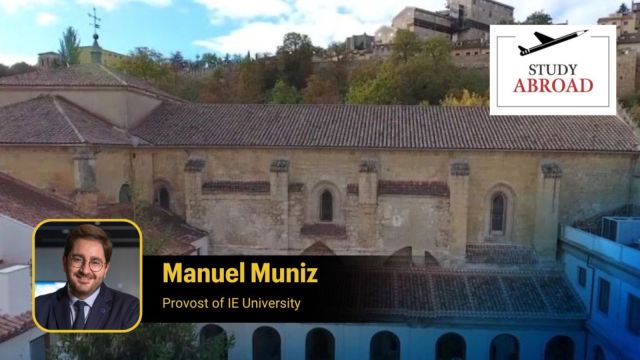Studying in Spain provides you with exposure to a different culture, a different labour market and more, believes Manuel Muniz, Provost of IE University. He talks to indianexpress.com about what Indian students need to work on, popular courses among Indian students in Spain, ‘rip off degrees’, and more.

While many nations are facing a housing crisis and there are fewer jobs (especially for international students), do you think Indians should spend on foreign degrees?
Spain is a highly cosmopolitan country and very open to international students. Some of our institutions, and this includes IE University, have over the past decades launched English language programmes. In our case, all of our programmes are fully taught in English. So, you get the best of two worlds: an English language educational space embedded in Spanish culture. Plus, you get Spanish weather, football and food, which are not to be belittled. On a more serious note, Spain also offers very high levels of security, access to the European labour market and an affordable cost of living.
Are there any particular areas which you would advise Indian students to work on, before applying to your university?
Nothing in particular on the academic side. I would advise them, however, to come with an open mindset. When they arrive in Madrid, they will join a community with over 140 nationalities. Not a single one of them is predominant; not even the Spanish one. I would also encourage them to develop an entrepreneurial mindset, one of the core values of IE and something that permeates everything we do. Entrepreneurship is about setting up your own business, but more broadly it is about taking control of your future. If you come to IE with ideas about who you want to become, you will find an institution willing to support you throughout and to provide you with the tools to get there. If you are unclear about who you want to become, you will find an institution willing to guide you and give you the confidence to get there.
Which courses have been more popular among Indian students?
The most popular undergraduate programmes have historically been the Bachelor’s in Business Administration, the Bachelor’s in Economics and the Bachelor’s in Computer Science & Artificial Intelligence. On the graduate side of things, we have significant numbers of Indian students matriculated in our International Master’s in Business Administration (IMBA), the Master’s in Management (MIM), and the Master’s in Business Analytics and Big Data.
How is IE University helping international students in getting placed?
Story continues below this ad
IE University has been consistently ranked as one of the top global institutions when it comes to employability. In fact, in the recent Times Higher Education ranking, which is the reference in its category, we were ranked 1st in Spain, 7th in Europe, and in the top 20 globally.
Virtually all of our graduates who wish to work are working within a few months of graduating. This is not a coincidence; it is the product of how our programmes are designed and how we engage with the world of practice. Our institution is constantly engaging with the corporate world, we have practitioners in our classrooms, job fairs, internship agreements with employers, company visits and many others. From the day you walk through our doors, you are being challenged to think about your professional future and encouraged to explore possibilities.
Spain is not a very popular study abroad destination for Indian students. What is IE University’s roadmap for Indian admissions?
Let me be very explicit here: having an international education is almost always a good idea. It provides you with exposure to a different culture, a different labour market, and a different way of approaching the world and tackling challenges. We live in a highly interconnected world. Being able to live, study and work in different places is almost a pre-requisite for understanding the reality of our time.
Story continues below this ad
I think the issue with Spain is that it is not normally associated with English language instruction, and this puts off candidates from non-Spanish speaking countries like India. But IE is different and we have been recruiting more and more students from India in the past years. We now have over 140 students from India enrolled in our programmes. This figure was under 100 only four years ago. For a university of 10,000 students, 140 Indians is still too low a number and we would wish to see it increase.
It is still a far cry from the over 700 US students we currently have, for example. So, it falls on us to reach out to Indian candidates, to partner with local institutions and to engage with Indian stakeholders moving forward.
We have a very generous scholarship programme run by the IE Foundation. Just this year, we granted more than 25 million euros (over 2 billion rupees) in scholarships. These are granted according to merit and need. The information is available on our official website.
The UK PM recently said that there are several universities which are running ‘rip off degrees’. Is there a similar problem in Spain? How can students find genuine ones?
Story continues below this ad
Our degrees cost a fraction of the US equivalent and are less expensive than many UK programmes. We are certain this does not happen at the expense of quality. We take this very seriously. We understand that education is an investment and that it needs to have a return. Our commitment is to make sure that the return is worth the immense effort of pursuing higher education and paying for it.
We recently published a copy where a lot of Indian students abroad told us that they have been facing mental health issues while studying abroad. Does IE University provide any mental health resources for such students who tend to feel lonely or anxious in a foreign land?
Yes. We have a dedicated office which provides support on mental health issues to our students. This is a must if you want to take good care of your students. Particularly when it comes to undergraduates, who are perhaps more vulnerable.
Is IE University planning to use AI in its curriculum or teaching ways?
Story continues below this ad
We already use AI quite intensely as a pedagogical tool. It is present in simulations, as a student support tool and others. IE issued an AI statement earlier this year expressing a desire to integrate AI into the classroom, rather than aim to expel it. We are firm believers in the need to integrate technology into our pedagogy as well as our research. Universities should not build learning spaces that are radically different from the world that their graduates are going to inhabit and work in. AI will be present in our lives moving forward. It should be part of your university experience as well.
Be it the introduction of four-year UG programmes or CUET, a lot of changes have been brought to the education system, especially since NEP 2020. Do you think that India is on the right track to improving its education system, which was heavily theory-based in the past?
Anything that brings the educational system closer to the needs of the real world and of employers is a positive development. Universities are there to train the next generation of leaders for both the public and private sectors. This is a high burden. It means providing applied learning and tools to manage real-world challenges. It seems to me that the Indian education system is headed in this direction and this is a positive development.

































